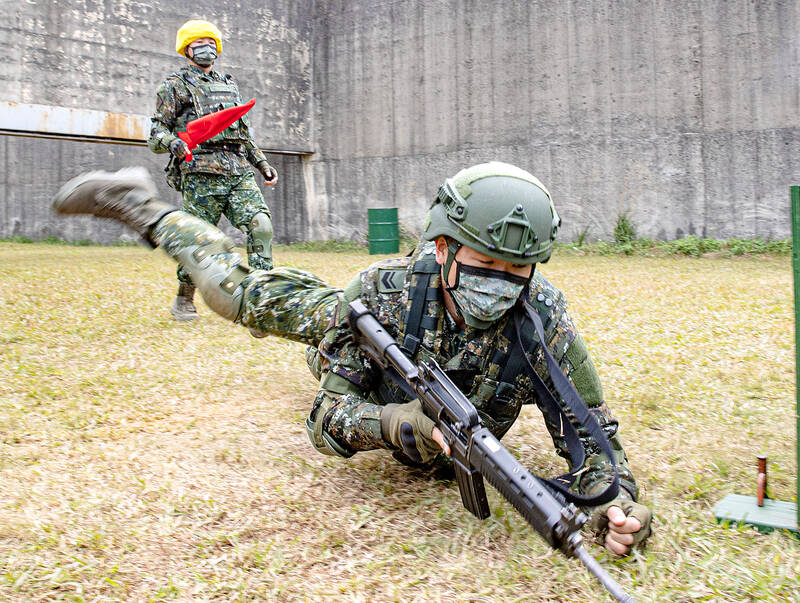The army yesterday showcased its new shooting training program that seeks to simulate battlefield conditions to better prepare soldiers for real combat situations.
In a demonstration open to the media at an army base in Taoyuan, soldiers showed reporters how they fire precisely at targets while standing, prone or kneeling.
Previously, soldiers were only trained to shoot their pistols or rifles in a stationary prone position, the army said.

Photo: CNA
The change was made to simulate battleground conditions, with trainees changing shooting positions as they would need to in combat and fixing their guns if they are jammed, it said.
Trainees are required to run past two obstacles before taking a total of 36 shots from three positions at nine targets that are about 50m to 75m away within 1 minute, 45 seconds, it said.
To pass, soldiers must hit the targets with six of 12 shots while standing, four of 12 while prone and four of 12 while kneeling, the army said.
Army Major Chang Chia-hua (張家華) of the army’s Education, Training and Doctrine Development Command, which devised the new program, said the biggest difference in the new approach was its emphasis on soldiers’ fitness and endurance, and their need to stay still and control their breathing while shooting after being in motion.
The latest change is part of the military’s ongoing training reforms to boost combat readiness as tensions between Taiwan and China remain high.

Taiwanese can file complaints with the Tourism Administration to report travel agencies if their activities caused termination of a person’s citizenship, Mainland Affairs Council Minister Chiu Chui-cheng (邱垂正) said yesterday, after a podcaster highlighted a case in which a person’s citizenship was canceled for receiving a single-use Chinese passport to enter Russia. The council is aware of incidents in which people who signed up through Chinese travel agencies for tours of Russia were told they could obtain Russian visas and fast-track border clearance, Chiu told reporters on the sidelines of an event in Taipei. However, the travel agencies actually applied

Japanese footwear brand Onitsuka Tiger today issued a public apology and said it has suspended an employee amid allegations that the staff member discriminated against a Vietnamese customer at its Taipei 101 store. Posting on the social media platform Threads yesterday, a user said that an employee at the store said that “those shoes are very expensive” when her friend, who is a migrant worker from Vietnam, asked for assistance. The employee then ignored her until she asked again, to which she replied: "We don't have a size 37." The post had amassed nearly 26,000 likes and 916 comments as of this

New measures aimed at making Taiwan more attractive to foreign professionals came into effect this month, the National Development Council said yesterday. Among the changes, international students at Taiwanese universities would be able to work in Taiwan without a work permit in the two years after they graduate, explainer materials provided by the council said. In addition, foreign nationals who graduated from one of the world’s top 200 universities within the past five years can also apply for a two-year open work permit. Previously, those graduates would have needed to apply for a work permit using point-based criteria or have a Taiwanese company

The Shilin District Prosecutors’ Office yesterday indicted two Taiwanese and issued a wanted notice for Pete Liu (劉作虎), founder of Shenzhen-based smartphone manufacturer OnePlus Technology Co (萬普拉斯科技), for allegedly contravening the Act Governing Relations Between the People of the Taiwan Area and the Mainland Area (臺灣地區與大陸地區人民關係條例) by poaching 70 engineers in Taiwan. Liu allegedly traveled to Taiwan at the end of 2014 and met with a Taiwanese man surnamed Lin (林) to discuss establishing a mobile software research and development (R&D) team in Taiwan, prosecutors said. Without approval from the government, Lin, following Liu’s instructions, recruited more than 70 software